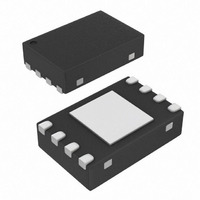MCP6V06T-E/MNY Microchip Technology, MCP6V06T-E/MNY Datasheet - Page 27

MCP6V06T-E/MNY
Manufacturer Part Number
MCP6V06T-E/MNY
Description
IC OPAMP AUTO-ZERO SGL 8-TDFN
Manufacturer
Microchip Technology
Datasheet
1.MCP6V06T-EMNY.pdf
(44 pages)
Specifications of MCP6V06T-E/MNY
Slew Rate
0.5 V/µs
Amplifier Type
Chopper (Zero-Drift)
Number Of Circuits
1
Output Type
Rail-to-Rail
Gain Bandwidth Product
1.3MHz
Current - Input Bias
6pA
Voltage - Input Offset
3µV
Current - Supply
300µA
Current - Output / Channel
22mA
Voltage - Supply, Single/dual (±)
1.8 V ~ 5.5 V
Operating Temperature
-40°C ~ 125°C
Mounting Type
Surface Mount
Package / Case
8-TDFN
Op Amp Type
Precision
No. Of Amplifiers
1
Bandwidth
1.3MHz
Supply Voltage Range
1.8V To 5.5V
Amplifier Case Style
TQFN
No. Of Pins
8
Number Of Channels
1
Voltage Gain Db
158 dB
Common Mode Rejection Ratio (min)
120 dB
Input Offset Voltage
0.003 mV
Operating Supply Voltage
3 V, 5 V
Maximum Operating Temperature
+ 125 C
Mounting Style
SMD/SMT
Minimum Operating Temperature
- 40 C
Lead Free Status / RoHS Status
Lead free / RoHS Compliant
-3db Bandwidth
-
Lead Free Status / Rohs Status
Details
Other names
MCP6V06T-E/MNYTR
Available stocks
Company
Part Number
Manufacturer
Quantity
Price
Company:
Part Number:
MCP6V06T-E/MNY
Manufacturer:
Microchip Technology
Quantity:
135
Company:
Part Number:
MCP6V06T-E/MNY
Manufacturer:
MICROCHIP
Quantity:
12 000
4.3.9.3
Figure 4-12
fier circuit. Usually, we choose R
The guard traces (with ground vias at the ends) help
minimize the thermal gradients. The resistor layout
cancels the resistor thermal voltages, assuming the
temperature gradient is constant near the resistors:
EQUATION 4-3:
FIGURE 4-12:
for Single Difference Amplifier.
© 2008 Microchip Technology Inc.
Where:
Thermal voltages are approximately equal
Note:
V
G
V
M
P
DM
V
V
M
P
Changing the orientation of the resistors
will usually cause a significant decrease in
the cancellation of the thermal voltages.
shows the recommended difference ampli-
V
V
=
MCP6V06
Difference Amplifier Layout for
Thermo-junctions
OUT
OUT
R4
R2
R1
R3
R
V
R
≈ V
≈ V
R
3
OS
1
2
/R
U
REF
REF
is neglected
1
1
PCB Layout and Schematic
= R
+ (V
+ (V
4
R
R
/R
P
P
4
3
U1
2
– V
– V
, difference gain
1
= R
M
M
V
)G
)G
2
REF
DM
DM
V
and R
OUT
V
V
3
OUT
REF
= R
4
.
4.3.9.4
The dual op amp amplifiers shown in
Figure 4-17
greater than 1, and a common mode gain of 1 .They
can use the layout shown in
ting resistors (R
bined so that the thermal voltages can be canceled.
The guard traces (with ground vias at the ends) help
minimize the thermal gradients. The resistor layout
cancels the resistor thermal voltages, assuming the
temperature gradient is constant near the resistors:
EQUATION 4-4:
FIGURE 4-13:
for Dual Non-inverting Amplifier.
Where:
Thermal voltages are approximately equal
Note:
G
G
R3
R2
R1
DM
CM
V
V
IA
IB
=
=
Changing the orientation of the resistors
will usually cause a significant decrease in
the cancellation of the thermal voltages.
(V
(V
produce a non-inverting difference gain
Dual Non-inverting Amplifier Layout
for Thermo-junctions
½ MCP6V07
½ MCP6V07
OA
OA
1 + R
1, common mode gain
V
2
) between the two sides are not com-
OS
– V
+ V
V
MCP6V06/7/8
is neglected
3
OB
OA
OB
R
R
R
R
/R
V
PCB Layout and Schematic
1
1
2
2
IA
U1
) ≈ (V
)/2 ≈ (V
2
U
U
, differential mode gain
1
1
V
Figure
IA
IB
IA
– V
R
R
V
3
3
+ V
OB
IB
4-13. The gain set-
DS22093B-page 27
)G
IB
Figure 4-16
)/2
DM
V
V
OA
OB
R3
R2
R1
and













